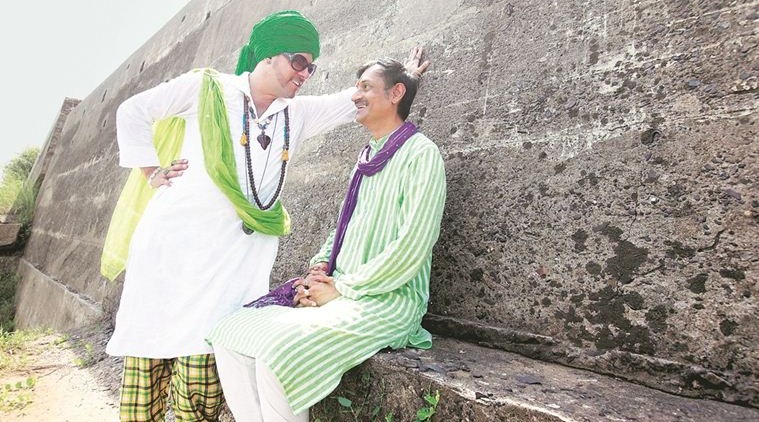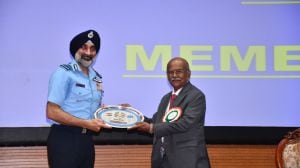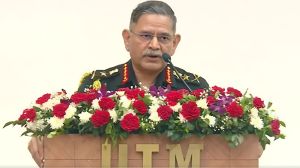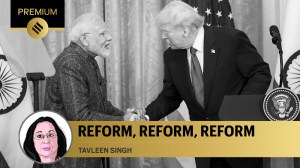Click here to follow Screen Digital on YouTube and stay updated with the latest from the world of cinema.
On the Other Side of the Rainbow
For Manvendrasinh Gohil, Baroda’s openly gay prince, a Gujarati film, Meghdhanushya, about a gay man, is a cause worth fighting for.
 Manvendrasingh Gohil, the prince of Gujarat’s Rajpipla royal dynasty, in conversation with his American friend, De Andre Duke, at his estate.
Manvendrasingh Gohil, the prince of Gujarat’s Rajpipla royal dynasty, in conversation with his American friend, De Andre Duke, at his estate.
On a scorching afternoon, 50-year-old Manvendrasinh Gohil walks through the lush green farms of his modest home, 15 km from Rajpipla in Narmada district. The ‘prince’ of one of Gujarat’s royal dynasties, Gohil became the face of India’s LGBT community in 2006, when he spoke for the first time about his sexual orientation in a newspaper interview.
His story is in the news again, as a Gujarati film that references his life, Meghdhanushya, is stuck at release, having been rapped by the Supreme Court for its discussion of a “social evil”. The film’s director KR Devmani had approached Gohil with the script, asking for suggestions on how to avoid a stereotypical depiction of gay people that Hindi cinema is full of. More than any individual, Gohil says, the film is the story of “any gay person in India, who knows he is different and how he comes to terms with his sexuality”.
“The protagonist of the film is highly educated, but he is discriminated against and he has to drop out of school. His parents throw him out of the house and he finds a partner, but life continues to be difficult. This is the life of any gay person in India,” says Gohil.
He would know. Young Manvendra grew up in Rajvant Palace in Rajpipla, the only son of Raghubir Singh Gohil and Rukmani Devi. The realisation that he was “different” came at the age of 13. But those were the Seventies, when there was little consciousness about different sexual identities in India. In 1991, he married “princess” Chandrika Kumari of Jhabua, hoping that his doubts would disappear. “In the 15 months of my marriage to a woman, I realised that I didn’t want to live a lie. I knew I wasn’t heterosexual,” he says.
His wife filed for divorce a year later, and Gohil made it clear to his family that he would not remarry. It would take another decade of living a repressed life before he could acknowledge his sexuality. In 2002, he suffered a nervous breakdown after years of living in self-imposed isolation. “I confided in the doctor about my sexuality. He conveyed it to my parents, who were initially shocked,” Gohil says.
Four years later, in a newspaper interview, he would talk of his struggle with identity. That led his mother, Rukmani Devi, who has not accepted Manvendra’s disclosure till date, to publicly disown him through newspaper notices in July 2006.
Over the years, he has found acceptance from the people close to him. Not just his parents, but common people in Rajpipla too had decried him, when he came out. “Today, many of those people have apologised for their behaviour,” he says.
Gohil went on to open his own charitable trust, Lakshya, which works to empower the gay and transgender community and spread awareness about HIV/AIDS. He now shares a cordial relationship with his father. “He has been supportive. At one of our (trust) events, he agreed to be the chief guest and when he spoke, he told the audience, ‘I want you to support my son in what he is doing and I am not saying this just as a father’,” Gohil says.
His estrangement from his mother has never “affected” him, he says, as he was brought up by a governess in childhood. “Until the age of 10, I always thought my governess was my mother. I am glad she was not around when I came out to say I am gay and proud of it. She would have been heartbroken,” Gohil says.
In the current case involving Meghdhanushya, Gohil has suggested that it be released in other states. The film premiered in Gandhinagar in April 2013, but the makers of the film have since been entangled in a legal battle with the state government over the issue of tax exemption. Every Gujarati film is granted tax exemption by the commissioner of entertainment tax. In December 2013, Devmani approached the Gujarat HC to direct the state government to extend the tax exemption to his film. The commissioner of entertainment tax asked the makers to omit words such as “Gay, homosexual and samlaingik” from the film, along with the voiceover by Gohil, to seek the tax exemption. The Gujarat HC ruled in favour of the filmmakers, rejecting the state government’s plea that the film promoted homosexuality and could not be given a tax break. The state government, however, appealed against the HC order in the Supreme Court, which ruled in favour of the state government in September this year, stating that “homosexuality is akin to social evil”.
Gohil, however, believes that the judiciary needs to play a bigger role in creating awareness about homosexuality. “In the case of reading down of Section 377, the Delhi HC judges were aware of the issue,” he says.
Gohil feels that although India’s LGBT community will achieve “freedom” in the near future, it would not be smooth sailing. He hopes that international pressure will bring about a change. “The fact that Prime Minister Narendra Modi met Tim Cook, Apple Inc’s openly gay CEO, during his visit to the US, is a positive sign,” he says. “I think we are very close to finding social acceptance,” he says.


Photos
- 01
- 02
- 03
- 04
- 05






























